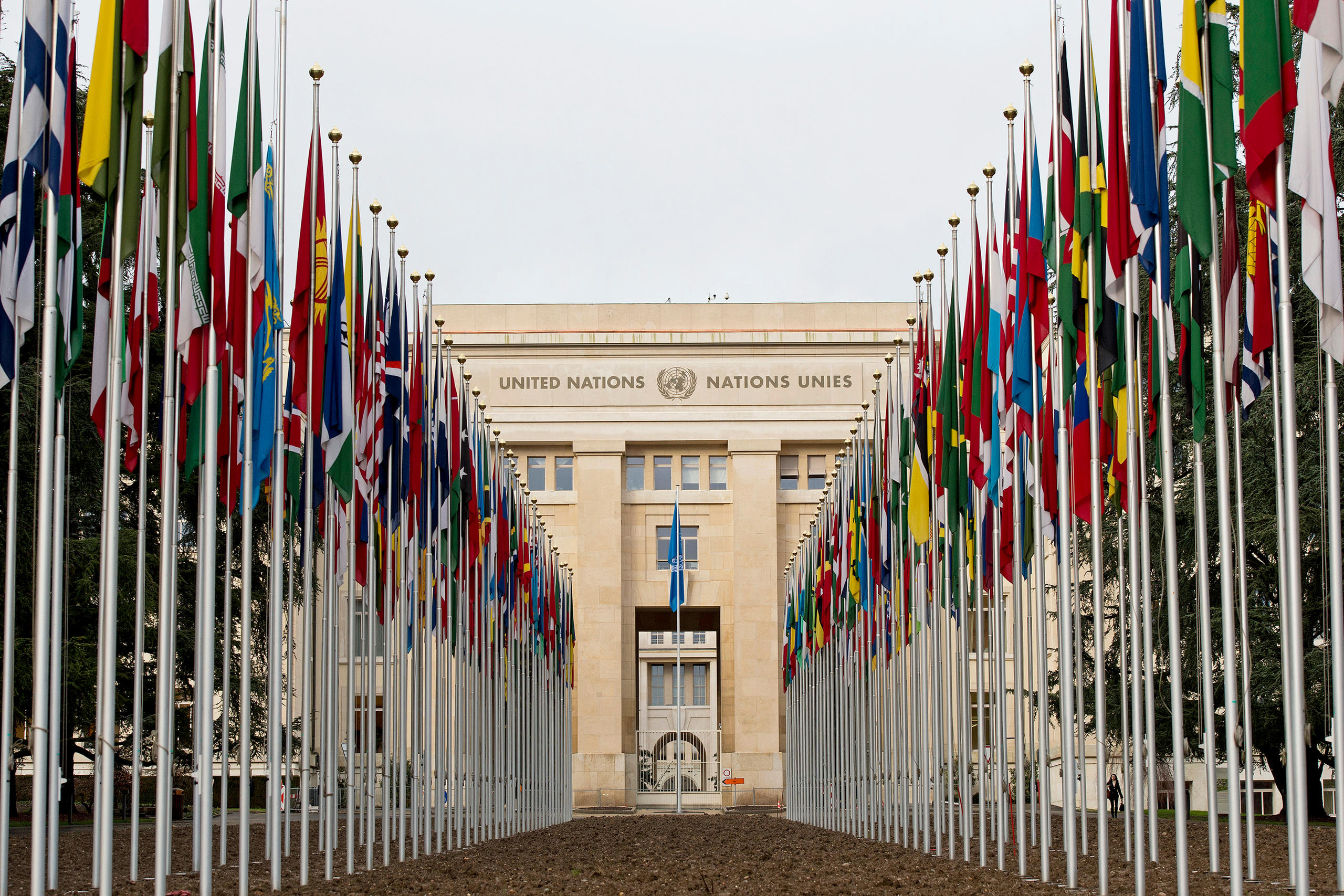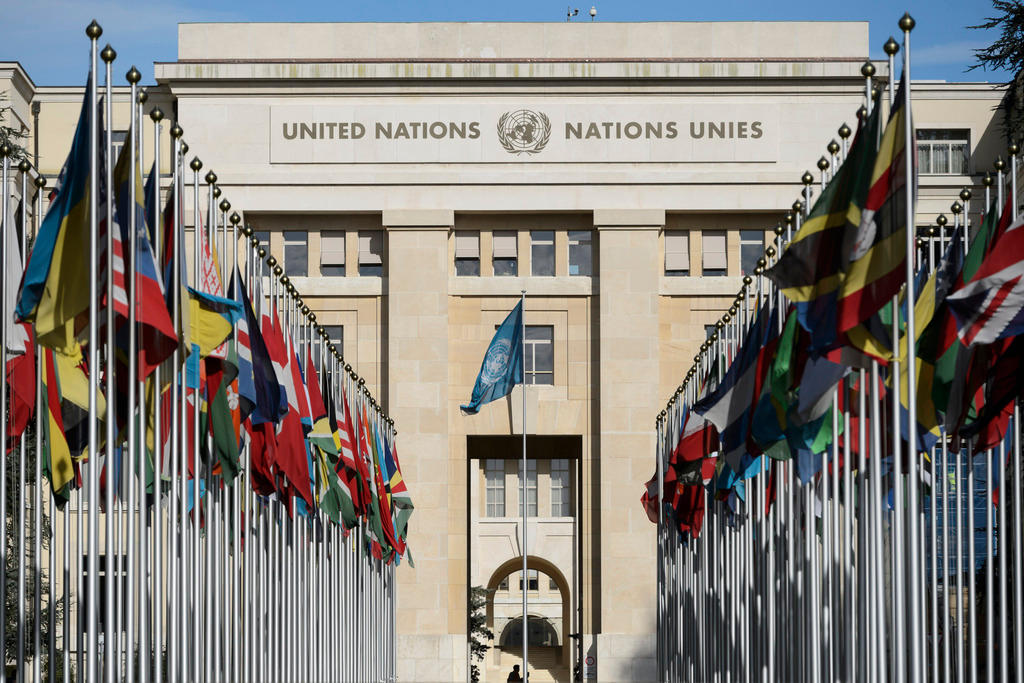Cashflow crisis looms over UN in Geneva

The United Nations is facing a serious cashflow crisis, as 63 states – including its largest contributor, the United States – have not paid their annual dues. In Geneva, officials at the UN’s European headquarters (UNOG) are considering ways to cut costs, while the host nation looks on anxiously.
The statement by UN Secretary-General Antonio Guterres on Tuesday to the UN General Assembly Budget CommitteeExternal link about the financial health of the global body was certainly dramatic.
“This month, we will reach the deepest deficit of the decade. We risk … entering November without enough cash to cover payrolls,” he said. “Our work and our reforms are at risk.”
By the end of September, UN member states had paid only 70% of the total assessment for the regular budget, compared with 78% at the same time last year.
According to the UN, 130 countries had paid $1.99 billion (CHF1.98 billion) in dues for this year, but $1.386 billion is still owed.
Washington, responsible for 22% of the regular budget, owes some $381 million for prior regular budgets and $674 million for the 2019 regular budget. It is also responsible for nearly 28% of the separate UN peacekeeping budget but has pledged to pay 25%. It currently owes $2.4 billion.
“It’s not about pointing fingers at one particular country. Look at the numbers: we have 193 UN member states and 130 of them have paidExternal link, and we are in October,” Alessandra Vellucci, director of the UN Information Service in Geneva, told swissinfo.ch.
Other big late-payers include Brazil, Iran, Israel, Mexico, South Korea, Saudi Arabia and Uruguay.
Extraordinary measures
In an interview in Le Temps newspaper last monthExternal link, Tatiana ValovayaExternal link described the “very difficult financial situation” she had inherited as the new UN Director General in Geneva.
The liquidity problem affects the UN’s Geneva headquartersExternal link, which employs 5,000 permanent staff, but not specialised agencies like the International Labour Organization (ILO) or UN Refugee Agency (UNHCR). In addition to the Swiss city, UN hubs in New York, Vienna and Nairobi and at regional commissions are also affected.
Vellucci said the full impact of the crisis on Geneva operations was being evaluated and managers were reviewing specific cost-saving proposals.
Since the start of the year, the UN has carefully adjusted hiring and non-post expenditure based on the cashflow. Guterres went further by requesting additional measures last month to deal with the shortfall: vacant posts cannot be filled, only essential travel is allowed, events outside normal working hours and some meetings may have to be cancelled or deferred.
“We will do everything we can not to have an influence on the salaries. The objective is not to touch staff costs,” Vellucci said.
‘Will we get paid?’
Ian Richards, president of the UN staff association in Geneva, said the cashflow crisis was extremely disruptive. He said colleagues were “very worried” that money could run out.
“They want to know if we will get paid,” he told swissinfo.ch.
“There’s been an effective hiring freeze since summer at the UN secretariat in Geneva. Right now, we’re looking at fuel bills, less overtime and fewer events. Services have been asked to delay conferences or to justify meetings this year.”
He also warned that decisions to postpone or cut spending on goods and services could have an impact on local Swiss suppliers to the UN.
Repercussions
Meanwhile, the host nation is looking on anxiously.
“Switzerland is particularly concerned about the liquidity crisis facing the UN,” said Swiss foreign ministry spokesperson Paola Ceresetti.
She said the crisis was likely to have a general impact on UN operations. Some repercussions of the financial squeeze were already visible, she noted, such as cuts to interpreting and reporting services during the June/July and September sessions of the UN Human Rights Council in GenevaExternal link.
States, especially smaller diplomatic missions, non-governmental organisations and journalists have voiced concerns about the cuts to this service and asked UNOG to reconsider.
“We will do that as soon as we get the money budgeted for next year,” Vellucci said.
Ceresetti said it was in Switzerland’s interest to ensure that this situation is resolved “as quickly as possible and in a sustainable manner”.
“Switzerland urges all member states to pay their annual contributions in order to allow the continuation of UN operations. It also calls for the rapid implementation of the reforms undertaken by the Secretary-General to improve the effectiveness and efficiency of the UN,” she added.

In compliance with the JTI standards
More: SWI swissinfo.ch certified by the Journalism Trust Initiative













You can find an overview of ongoing debates with our journalists here . Please join us!
If you want to start a conversation about a topic raised in this article or want to report factual errors, email us at english@swissinfo.ch.